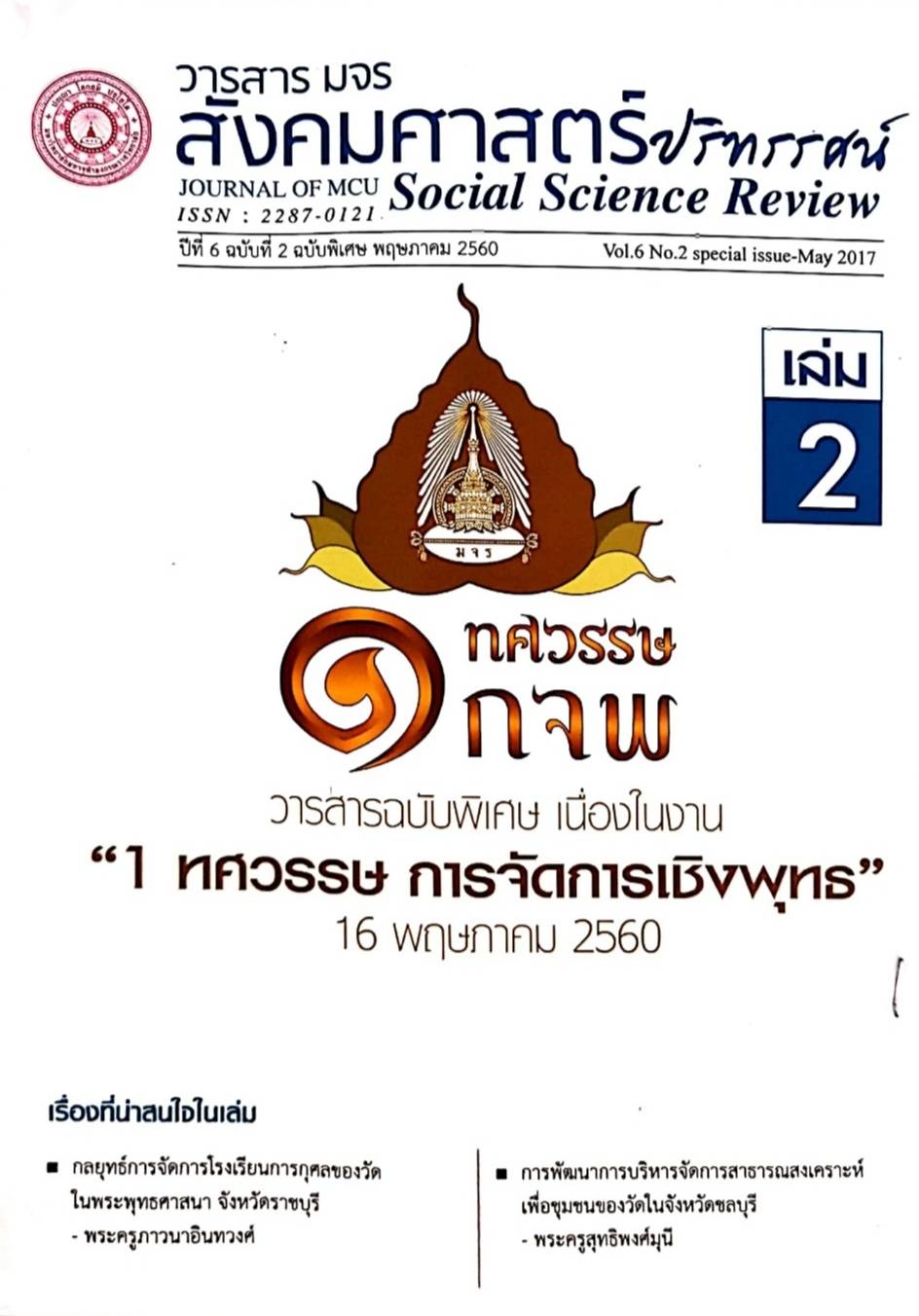การพัฒนาทุนมนุษย์เพื่อเพิ่มประสิทธิภาพในการปฏิบัติงานตามแนวพุทธบูรณาการขององค์กรปกครองส่วนท้องถิ่นภาคใต้ตอนบน
คำสำคัญ:
การพัฒนาทุนมนุษย์ ตามแนวพุทธบูรณาการ องค์กรปกครองส่วนท้องถิ่นบทคัดย่อ
บทความนี้มีวัตถุประสงค์ 3 ประการ คือ 1) เพื่อศึกษาสภาพทั่วไปและปัญหาของการพัฒนาทุนมนุษย์ขององค์กรปกส่วนท้องถิ่นภาคใต้ตอนบน 2) เพื่อศึกษากระบวนการพัฒนาทุนมนุษย์ขององค์กรปกครองส่วนท้องถิ่น 3) เพื่อเสนอรูปแบบการพัฒนาทุนมนุษย์เพื่อเพิ่มประสิทธิภาพในการปฏิบัติงานตามแนวพุทธบูรณาการขององค์กรปกครองส่วนท้องถิ่นภาคใต้ตอนบน การศึกษาวิจัยครั้งนี้ใช้วิธีวิจัยแบบผสานวิธี ทั้งเชิงคุณภาพและเชิงปริมาณ การวิจัยเชิงคุณภาพ เก็บข้อมูลด้วยการสัมภาษณ์เชิงลึกจากผู้ให้ข้อมูลสำคัญจานวน 18รูป/คน ซึ่งเป็นนายกเทศมนตรี รองนายกเทศมนตรี ปลัดเทศบาล ผู้ทรงคุณวุฒิ และประชาชนผู้มีส่วนได้ส่วนเสียจากเทศบาลนคร เทศบาลเมืองและเทศบาลตำบล และการสนทนากลุ่มเฉพาะ จากผู้เชี่ยวชาญและนักวิชาการ จานวน 9 รูป/คน เลือกแบบเฉพาะเจาะจงและนามาวิเคราะห์ข้อมูลด้วยวิธีอุปนัย และพรรณนาความ การวิเคราะห์ข้อมูลเชิงปริมาณเก็บข้อมูลจากประชากรเป็นผู้บริหาร และพนักงานเทศบาลนคร เทศบาลเมืองและเทศบาลตำบล จานวน 7,741 คน ได้กลุ่มตัวอย่าง จานวน400 คน
โดยใช้เครื่องมือแบบสอบถาม ซึ่งมีค่าความเชื่อมั่นทั้งฉบับเท่ากับ 0.9796 นามาวิเคราะห์ข้อมูลด้วยสถิติพรรณนา ได้แก่ ค่าร้อยละ ค่าเฉลี่ย และค่าเบี่ยงเบนมาตรฐาน
ผลการวิจัยพบว่า
1. สภาพทั่วไปและปัญหาของการพัฒนาทุนมนุษย์ขององค์กรปกครองส่วนท้องถิ่นภาคใต้ตอนบน เน้นการปฏิบัติงานของผู้บริหารกับพนักงาน พบว่า มีการประชุม จัดการอบรมศึกษาดูงานนอกสถานที่ เพื่อสร้างความรู้ในการพัฒนาทุนมนุษย์ การทางานใช้เทคโนโลยีในองค์กรเพื่อสะดวกในการบริหารจัดการด้านข้อมูลในการพัฒนาทุนมนุษย์ พบว่า ผู้บริหารใช้ ศีล สมาธิปัญญา ในการวางแผนสั่งการ ควบคุม โดยใช้ความรู้ ทักษะ อยู่ในระดับมาก ส่วนด้านความสามารถ อยู่ในระดับปานกลาง สำหรับพนักงาน ใช้ศีล สมาธิ ปัญญาในการปฏิบัติงานบุคคล การประเมินผลการดูแลและรับผิดชอบงานงานธุรการขององค์กร โดยใช้ ความรู้ ทักษะ เกณฑ์อยู่ในระดับมาก และด้านความสามารถอยู่ในระดับปานกลาง ด้านปัญหา องค์กรยังขาดงบประมาณ การทางานของบุคลากร ผู้บริหารใช้ความสามารถในการบริหารควบคู่ไปกับหลักไตรสิกขายังไม่เต็มความสามารถ มีบางองค์กรมีปัญหาด้านพฤติกรรมในการทางาน เช่นบุคลากรไม่สนองตอบต่อระบบการให้บริการและมาตรฐานคุณภาพ
2. การศึกษากระบวนการพัฒนาทุนมนุษย์ในองค์กรปกครองส่วนท้องถิ่น พบว่า การมีการกำหนดนโยบายและวางแผนในการพัฒนาทุนมนุษย์ของเทศบาล เน้นการพัฒนา ด้านความรู้ทักษะ ความสามารถให้แก่พนักงานเทศบาลอย่างต่อเนื่อง จัดให้มีเทคโนโลยีสารสนเทศและแหล่งค้นคว้าข้อมูลที่ทันสมัย เพื่อให้สะดวกรวดเร็วในการปฏิบัติงาน ส่งเสริมให้มีความรู้เพิ่มขึ้นให้แก่บุคลากร เน้นให้มีคุณธรรมจริยธรรมในการบริการประชาชน ส่งเสริมการทางานเป็นทีม พัฒนาบุคลากรตามหลักธรรมาภิบาลและส่งเสริมสวัสดิการแก่บุคลากรในองค์กรปกครองส่วนท้องถิ่น
3. รูปแบบการพัฒนาทุนมนุษย์เพื่อเพิ่มประสิทธิภาพในการปฏิบัติงานตามแนวพุทธบูรณาการขององค์กรปกครองส่วนท้องถิ่นภาคใต้ตอนบน การนำหลักธรรมไตรสิกขา ได้แก่ ศีล (พัฒนาพฤติกรรม) สมาธิ (พัฒนาจิตใจ) และปัญญา (พัฒนาความสามารถ) นำมาใช้ในการพัฒนา ทุนมนุษย์ การปฏิบัติงานของผู้บริหาร ด้านศีลได้ใช้ความรู้ ทักษะ และความสามารถ ในการวางแผน การสั่งการ ควบคุม ด้านสมาธิ ใช้ความรู้ ทักษะ และความสามารถ ในการวางแผน สั่งการ ควบคุม ด้านปัญญาใช้ความรู้ ทักษะ และความสามารถ ในการวางแผน สั่งการ ควบคุม เพื่อให้เป็นไปตามนโยบายที่วางไว้ สาหรับพนักงาน ในการปฏิบัติหน้าที่ ด้านศีลได้ใช้ความรู้ ทักษะ ความสามารถในการปฏิบัติงานบุคคล การประเมินผล การดูแลและรับผิดชอบงานธุรการขององค์กร ด้านสมาธิ ได้ใช้ความรู้ ทักษะ และความสามารถ ในการปฏิบัติงานบุคคล การประเมินผลการดูแล และรับผิดชอบงานธุรการขององค์กร และด้านปัญญา ได้ใช้ความรู้ ทักษะ และความสามารถ ในการปฏิบัติงานบุคคล การประเมินผลการดูแลและรับผิดชอบงานธุรการขององค์กร เพื่อให้บรรลุ
เป้าหมายการพัฒนาทุนมนุษย์ในองค์กรปกครองส่วนท้องถิ่น
เอกสารอ้างอิง
บุญทัน ดอกไธสง. (2551). การจัดการทุนมนุษย์. กรุงเทพมหานคร : พิมพ์ตะวัน.
พรธิดา วิเชียรปัญญา.(2547).การจัดการความรู้พื้นฐานและการประยุกต์ใช้.กรุงเทพฯ: ธรรมกมลการพิมพ์.
พระครูนิวิฐศีลขันธ์ (ณรงค์ ฐิตวฑฺฒโน), (2557).“รูปแบบการพัฒนาทุนมนุษย์ตามหลักพุทธธรรมในองค์กรปกครองส่วนท้องถิ่น”. การประชุมระดับชาติ มจร ครั้งที่ 1.บัณฑิต วิทยาลัย :มหาวิทยาลัยมหา จุฬาลงกรณราชวิทยาลัย.
พระพรหมคุณาภรณ์ (ป.อ.ปยุตฺโต).(มมป.). ศึกษาฝึกฝนพัฒนาตนให้สูงสุด. (ชุดธรรมะประยุกต์สาหรับคนทางานลาดับที่ 6. กรุงเทพมหานคร: อมรินทร์.
McGregor, Douglas M., (1960). The Human Side of Enterprise, (NewYork: McGraw-Hill Book Company.
ดาวน์โหลด
เผยแพร่แล้ว
รูปแบบการอ้างอิง
ฉบับ
ประเภทบทความ
สัญญาอนุญาต
ลิขสิทธิ์ (c) 2020 วารสาร มจร สังคมศาสตร์ปริทรรศน์

อนุญาตภายใต้เงื่อนไข Creative Commons Attribution-NonCommercial-NoDerivatives 4.0 International License.
เพื่อให้เป็นไปตามกฎหมายลิขสิทธิ์ ผู้นิพนธ์ทุกท่านต้องลงลายมือชื่อในแบบฟอร์มใบมอบลิขสิทธิ์บทความให้แก่วารสารฯ พร้อมกับบทความต้นฉบับที่ได้แก้ไขครั้งสุดท้าย นอกจากนี้ ผู้นิพนธ์ทุกท่านต้องยืนยันว่าบทความต้นฉบับที่ส่งมาตีพิมพ์นั้น ได้ส่งมาตีพิมพ์เฉพาะในวารสาร มจร สังคมศาสตร์ปริทรรศน์ เพียงแห่งเดียวเท่านั้น หากมีการใช้ภาพหรือตารางหรือเนื้อหาอื่นๆ ของผู้นิพนธ์อื่นที่ปรากฏในสิ่งตีพิมพ์อื่นมาแล้ว ผู้นิพนธ์ต้องขออนุญาตเจ้าของลิขสิทธิ์ก่อน พร้อมทั้งแสดงหนังสือที่ได้รับการยินยอมต่อบรรณาธิการ ก่อนที่บทความจะได้รับการตีพิมพ์ หากไม่เป็นไปตามข้อกำหนดเบื้องต้น ทางวารสารจะถอดบทความของท่านออกโดยไม่มีข้อยกเว้นใดๆ ทั้งสิ้น





